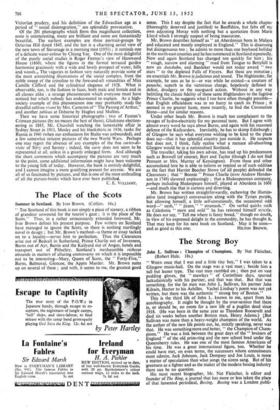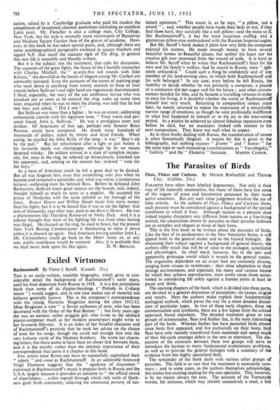The Strong Boy
John L. Sullivan : 'Champion of Champions. By Nat Fleischer. (Robert Hale. 18s.) "WHEN once that I was and a little tiny boy," I was taken to a Glasgow music-hall. On the stage was a vast man • side hint a tall but leaner type. The vast man rambled on ; the ben put on vast pudding gloves, the " mawleys " of Corinthian days, sparred lackadaisically with his partner, and that was that. But that was something, for the fat man was John L. Sullivan, his partner Jake Kilrain, Hector to his Achilles. Vachel Lindsay's poem was not yet written, but there was the authentic "strong boy of Boston." This is the third life of John L. known to me, apart from his autobiography. It might be thought by the over-serious that there is, or should be, no room for a new life of a pugilist dead since 1918. (He was born in the same year as Theodore Roosevelt and died six weeks before another Boston man, Henry Adams.) }But Sullivan was more than a heavy-weight champion of the world. As the author of the new life points out, he, strictly speaking, never was that. He was something more and better, " the Champion of Cham- pions." He was a link between the great days of the " bruisers of England" of the old prize-ring and the new school bred under the Queensberry rules. He was one of the most famous Americans of his time. He was a great international figure, too. Whether he could have met, on even terms, the successors whom connoisseurs most admire, Jack Johnson, Jack Dempsey and Joe Louis, is more a matter of speculation than what songs the sirens sang. But of his greatness as a fighter and as the maker of the modern boxing industry there can be no question. His most recent biographer, Mr. Nat Fleischer, is editor and founder of The Ring, a journal that has more or less taken the place of that lamented periodical, Boxing. Boxing was a London publi- cation, edited by a Cambridge graduate who paid his readers the compliment of occasional classical quotations (including an excellent Latin pun). Mr. FleisAer is also a college man, City College, New York, but his style is normally more reminiscent of Brpadway and Madison Square Garden than of the groves of academe. How- ever, in this book he has taken special pains, and, although there are some autobiographical paragraphs enclosed in square brackets and signed N.F. that recall the staccato stfile of The Ring, in general this new life is smoothly and blandly written. But it is the subject, not the treatment, that calls for discussion. The accounts of the great fights, the fiasco of the Chantilly encounter with Charley Mitchell, the" seventy-five red rounds with Jake Kilrain," the downfall at the hands of elegant young Mr. Corbett are admirably narrated. Even the accounts of the scores of aspiring pugs who went down in anything from twenty seconds to three or four rounds before Sullivan's red right hand are ingeniously discriminated. I liked, especially, the story of the too ambitious novice who was knocked out as soon as he entered the ring, woke up -some time later, enquired when he was to meet the champ, was told that he had met him, and asked, " Did I win ? " But Sullivan was more than a fighter ; he was an orator, addressing enthusiastic crowds with his signature tune, " Your warm and per- sonal friend, John L. Sullivan." He was a prodigious eater and drinker. Of Americans of that age, perhaps only Senator Boies Penrose could have competed. He drank away hundreds of thousands of dollars, aided by thirsty and loyal friends. When eating, he recalled the John Reilly of the song ; it was "Bass's ale by the pail." But for refreshment after a fight or just before it his favourite tipple was champagne, although he by no means despised whisky. He seldom arrived in a state of complete incapa- city, for, once in the ring, he sobered up miraculously, knocked out his opponent, and, retiring to the nearest bar, ordered "wine for the boys." As a hero of American youth he left a great deal to be desired. But all was forgiven him, even that astonishing volte face when he became and remained a teetotaller and, what was worse, a temperance lecturer, eschewing even his beloved Bass. Before he defeated John Barleycorn, Sullivan knew great success on the boards, and, indeed, thought himself as much an actor as a pugilist. He accepted the praise of Modjeska with the same aplomb as the homage of the fancy. Honest Hearts and Willing Hands made him more money than his fights, but it is to be feared that it was to see the fighter that tens of thousands, year after year, paid to see Honest Hearts. He was a phenomenon like Theodore Roosevelror Moby Dick. And it is a solemn thought that most of his fighting life was lived when boxing was illegal. He cleaned up the ring, he used to boast, but the present New York Boxing Commissioner is threatening to close it down unless it is cleaned up again. Had American boxing another John L., Mr. Christenberry could go back to the Hotel Astor or, at any rate, public confidence would be restored. Alas, it is probable that we shall never look upon his like again. D. W. BROGAN.



































 Previous page
Previous page